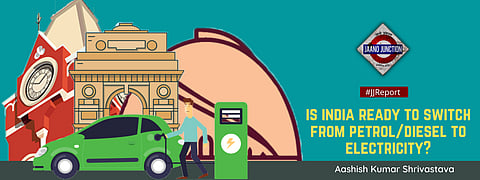

Jyoti Malhotra, the Managing Director of Volvo cars India on Saturday said “By 2025 we will have a big inventory of electric cars in India”. This comes as good news at the prima facie but, will India switch to EVs to reduce the pollution significantly, or will it transfer the responsibility of the emission of pollution?Similar to Volvo, many companies in India are working hard to create a line-up of Electric Cars (EV) so that they can be the first to establish a stronghold in the market. Some of the well-known companies that are producing EVs in India or are working to produce EVs are- Mahindra Electric, Tata Motors, Hyundai, Ashok Leyland, Volvo, etc. The two main arguments given by all the companies to switch to EVs are that it will reduce pollution significantly and it will save you around 1/6th of your money while being used when compared to vehicles that use Petrol as fuel.Two-wheeled and three-wheeled EVs are taking over the market irrespective of the incentives provided to purchase Four-wheeled EVsAs per Nitin Gadkari’s words, the Government of India wants EVs to form 30% of all private cars, 70% of commercial vehicles, 40% of buses, and 80% of two and three-wheeler sales by 2030. In order to do so, the consumers have to be attracted by incentives to encourage them to make the transition of switching from Petrol/Diesel to electricity as fuel. For the same, several incentives have been announced by the Union as well as state governments. Let’s have a look at the incentives announced by the Union government:Exemption from registration and renewal fees across the countryLower GST rate- 5% GST will be applicable on EVs which is one-sixth to one-eighth of what is applicable on Petrol and Diesel carsFirst-time individual buyers who take a loan can also get tax benefits of up to Rs 1.5 lakh under Section 80EEB of the Income Tax Act. In addition to these incentives, state governments have taken a step forward and announced more incentives.Irrespective of these incentives mainly targeted to boost the sales of four-wheeler EVs, what can be the reason for the two and three-wheeler EVs to thrive in the market? The primary reason for this is the cost of the battery. The average cost of a battery for a four-wheeled EV is half the cost of the vehicle itself. The reason for this is less focus on research. Earlier the cost of batteries for two and three-wheelers was also approximately half of the value of the vehicle but, due to the focus on research, the cost has now been reduced significantly. We can expect the same to happen for four-wheeled EVs by around 2025.Due to this factor, the two and three-wheeled EVs are thriving in the market irrespective of the numerous schemes and benefits announced for people who purchase four-wheeled EVs. Will EVs really reduce pollution in India?The answer to this while looking at the present scenario will be a big fat no. If everyone switches to EVs then yes the pollution will be reduced when it comes to petrol and diesel but, electricity will be required in huge amounts to charge all those EVs. India is a country that still depends heavily on fossil fuel, coal to be precise to produce electricity. The more electricity we produce, the more pollution will be generated through the power plants. Therefore if we all switch to EVs by say 2030 which was BJP’s plan in 2017 then we will be just changing the source of pollution but, pollution will still remain at around the same level. If we really wish to switch to EVs then we have to look for an alternative power source that is renewable and cost-effective.Alternative for Coal as the source of fuel for EVs?There are multiple alternatives to coal as the source of fuel for EVs. One such source is Methanol. Methanol is a prescribed fuel in all major automobile races in the world from 1965 till 2008 when it was joined by ethanol. Now, one may ask what is methanol produced from? Methanol can be produced from any biomass, any municipal solid waste to every manner of crop residue.Biomass can be found in abundance and it will always be a renewable source of energy hence, we should focus more on this. Research needs to be conducted to devise a plan of action to use biomass as a source of fuel on a nationwide scale.The need to focus on research for devising a well-thought-out plan to switch from Petrol/Diesel based vehicles to Electric VehiclesIt cannot be emphasized enough that there is an absolute need to focus more and more on research so that the transition that the Government wants India to go through can be as smooth as possible. The Government of India needs to look at the matter from all possible aspects so that no section of the society gets affected negatively by this transition. This is a huge change we are talking about and the Government should make sure that the citizens of India don’t end up paying for the errors that they never made.
